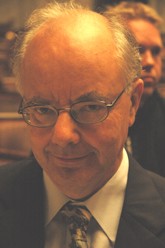Peter J. Hammond
Professor (Emeritus)

[email protected]
http://www.stanford.edu/~hammond/
Page in Stanford Directory
Phone:
Office: 579 Serra Mall,
Stanford, CA 94305-6072
Office hours:
Interests
- Research:
Economic theory – in particular, public economics, general equilibrium and mathematical economics, social choice, game theory
- Current Research:
Welfare economics with uncertainty and asymmetric information, foundations of rational choice, sequence economies, macroeconomics and games with a continuum of agents
- Teaching:
Mathematics for economic analysis (2 textbooks), welfare economics, decision and game theory, general equilibrium, ethics, in economic policy
- Professional Affiliations:
AEA, British Academy (Fellow), Economic Society, (Fellow), European Economic Association, Royal Economic Society, Society for the Promotion of Economic Theory, Society for the Advancement of Economic Theory, Social Choice and Welfare Society, Game Theory Society, Association for Public Economic Theory
Recent Publications
(1) “Monte Carlo Simulation of Macroeconomic Risk with a Continuum of Agents: The Symmetric Case” (with Yeneng Sun) Economic Theory, 21, pp. 743-766, 2003
(2) “Expected Utility in Non-Cooperative Game Theory,” in Handbook of Utility Theory, Vol.2: Extensions, Kluwer Academic Publishers, pp. 982-1063, 2004
(3) “Social Welfare Functionals on Restricted Domains and in Economic Environments” (with Georges Bordes and Michel Le Breton), Journal of Public Economic Theory, 7 pp. 1-25, 2005
(4) “Gains from Trade versus Gains from Migration: What makes Them So Different?” (with Jaume Sempere) Journal of Public Economic Theory, 8 pp. 145-170, 2006
List of Stanford Working Papers
Current Courses
Education
Ph.D., (Economics), B.A., (Mathematics), Cambridge University
Additional Info:
Peter J. (for Jackson) Hammond was born in Marple, then in Cheshire, now in Greater Manchester, a few hours after the end of World War II in Western Europe. He was the first child of the late Fred J. Hammond (chartered accountant) and Elsie Hammond (who had worked in the trustee department of a bank). He was taken to Kingskerswell, Devon before he could walk or talk. In 1949 his twin brothers Brian and Nigel were born nearby in Newton Abbot. He then left Devon for Ipswich, Suffolk at the age of 5, having meanwhile learned the rudiments of reading, writing (right-handed), arithmetic, and cricket (left-handed). After another family move from Ipswich to Croydon, his university career began in 1964 studying first mathematics (as an Open Scholar), then economics at Trinity Hall, Cambridge. Earlier in life he displayed much more enthusiasm than ability in several ball games, then chess, and mountain walking. Starting in 1965 he began a gradual transition from playing games toward still continuing attempts to understand game theory. Soon this developed into formally studying the application of game theory, and of mathematical and probabilistic tools more generally, first to economics, then social choice theory, other social sciences, even philosophy. In 1972 he met Mrudula Patel, born 1952 in Gujarat, India, who studied Economics at the University of Essex, then Nuffield College, Oxford. They married in August 1979 when Mrudula was Mervyn King's research associate at the University of Birmingham, just before moving to Stanford in California. Mrudula gave up economics soon after finishing a PhD at the University of Essex in 1990. She recently became interested in oil painting. Peter is fortunate to have been encouraged throughout life to acquire interests in many forms of human endeavour and learning, during an age with no shortage of fascinating and worthwhile new ideas, not least in contemporary economics. He has also benefited from many contacts with the international community of scholars. Apart from several decades in California, there have been academic visits long enough to justify opening temporary bank accounts in Australia, Austria, Belgium, France, Germany, Israel, Italy, and Japan. On joining the Fellows of the British Academy, he is happy to share credit for this great honour with a wide circle of teachers, advisers, and colleagues whose generosity with their time, wisdom, confidence and support has made this possible. It is also a welcome reminder of one's duty to ensure that important guiding principles and ideas continue to be passed on to the next generation. Not least, it emphasises the need to ensure that similar opportunities for an academic career remain available to those most able to benefit from them. A temptation he resists less than he should is to essay epigrammatic one-liners such as 'Dreams defy reality', 'Automata err automatically', and even 'Britain is one hour and several years behind Europe' whenever yet another train is seriously delayed. Finally, he wonders why educators fail to emphasise their role in improving leisure.